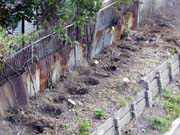The problem of traffic noise and exhaust fumes may be lessening as the state Department of Transportation planted a wall of trees along the side of Route 3 – again.
This is the second effort in a decade to help Maple Street residents between the Paterson Plank Road bridge and the Meadowlands Parkway exit.
Older residents in the area can remember a time when traffic didn’t rush passed the backs of their houses and when traffic jam car fumes didn’t ooze through their windows and doors, but many living there now have lived with the noise and fumes all of their lives.
This segment of Route 3 was constructed in 1965 when the state decided to alter the route of the existing highway, which is now Flanagan Way. The state was originally supposed to purchase all the houses and demolish them, but in a last minute change of heart, took many people’s backyards instead.
One of the bigger problems was the flaw in highway design that left about 900 feet of the highway without a shoulder so that for some residents the highway’s slow lane comes within a yard of their back windows.
Seventy-seven year old Tony Winsick has lived on Maple Street since 1966 after moving there from Jersey City. His house is one of the last on the stretch and one of the closest to the highway. He said the noise is horrendous and cars roar past his bedroom at night.
“I wanted the state to put up a sound barrier here,” he said. “But they never did.”
Winsick invested in a fence to keep out the noise. It helped marginally. Some residents pushed to have a sound barrier installed, but a study by the state showed the area didn’t have enough houses to justify the expense, so the state planted trees instead. The trees promptly died.
Earlier this month, the state came back at the request of Assemblyman Anthony Impreveduto, to tear out the weeds and replant trees in their place. Impreveduto said he had wanted to do something about the dead trees for five or six years – most had died from lack of water or had been choked by opportunistic weeds.
“Some years ago, we tried to get a sound barrier there, but there wasn’t enough room behind the houses,” he said. “Back in 1992, I was able to get the state DOT to come in because our party was in power at the time. When the Democrats are in power, we get small things like this done.” Second Ward Councilman Bob Kickey said the town had asked for Impreveduto’s intervention following the example of Storage Mart across the highway that had cleaned up weeds there and replanted.
“We thought the state could do the same thing for the Maple Street side of the highway,” Kickey said. “The DOT cleaned everything up, re-seeded the area with grass and planted new trees.”
Elliot Monk, a resident of Maple Street for 10 years, feared the loss of weeds would actually leave property owners more vulnerable to noise and pollution.
“I think the weeds helped absorb some of the sound and the fumes,” he said, although he suspected the cleanup of the highway side had more to do with the new library opening across the highway. “I think the town wants to make everything look good for the grand opening.”
One man who did not give his name laughed a little when asked about the newly installed trees. He did not seem to believe they would help against the sound or the fumes.
A 43-year-old resident who did not wish to give his name either said he has lived on Maple Street all of his life.
“After a while you get use to the sound,” he said, although he believed the old trees had helped reduce noise and pollution and hoped the new trees would do the same.
“I was opposed to the sound barrier,” he said. “I didn’t want to have a huge wall in my back yard.”
Kickey said the state will water the trees for a while and then request residents to do the watering to those trees nearest their houses. Impreveduto said the watering would only be necessary until the trees take root.
Mayor Dennis Elwell said the town might be able to help out with its watering truck, a vehicle it currently uses to water islands filled with flowers in the Plaza and other sections of town. In drought conditions, such as the one the area suffered over the summer, the town has permission from the state to use effluent form the town’s sewerage plant.
“It is clean water but it can only be used in places where the public might walk,” Elwell said.
